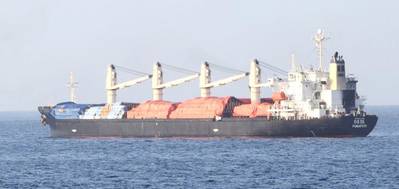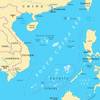The United States is closely watching a recent increase in piracy off the coast of Somalia, a senior U.S. military official said on Sunday as Defense Secretary Jim Mattis visited an important military base in Djibouti.
The rise in piracy attacks has at least partially been driven by famine and drought in the region, the top U.S. military commander overseeing troops in Africa said during Mattis' visit as part of a week-long trip to the Middle East and Africa.
The United States uses the base in Djibouti, a tiny country the size of Wales at the southern entrance to the Red Sea, as a launch pad for operations in Yemen and Somalia.
The sudden string of attacks by Somali pirates comes after years without a reported incident. Attacks peaked with 237 in 2011 but then declined steeply after ship owners improved security measures and international naval forces stepped up patrols.
This month has seen a new rash of attacks, with two ships captured and a third rescued by Indian and Chinese forces after the crew radioed for help and locked themselves in a safe room.
"The bottom line is there have been a half dozen or so(incidents)," Marine General Thomas Waldhauser said at a press conference standing alongside Mattis.
"We're not ready to say there is a trend there yet but we'll continue to watch," he said, adding one reason for the increase was famine and droughts in the region since some vessels targeted were carrying food and oil.
According to the U.N. World Food Programme more than 20 million people from Nigeria, Somalia, South Sudan and Yemen are at risk of dying from starvation within the next six months.
In South Sudan alone, more than 100,000 people are suffering from famine with a further million on the brink of starvation.
Mattis added that while the situation was being watched, he did not expect a U.S. military response to the surge in piracy.
A U.S. defense official, speaking on the condition of anonymity, said international shipping companies had started to become complacent about their security, which could also help explain the rise in piracy incidents.
Militancy in the Region
Djibouti is strategically important as it is on the route to the Suez Canal. The barren nation, sandwiched between Ethiopia, Eritrea and Somalia, also hosts Japanese and French bases.
The U.S. base, which has about 4,000 personnel, is located just miles from a Chinese one, still under construction, which has caused concern to some U.S. officials.
Mattis' visit to the base comes as the United States has been increasing pressure on militant groups such as al Shabaab in the region.
The White House recently granted the U.S. military broader authority to strike al Qaeda-linked al Shabaab militants in Somalia.
Waldhauser told reporters that he had not yet used the new authorities given to him by the White House.
Al Shabaab has been able to carry out deadly bombings despite losing most of its territory to African Union peacekeepers supporting the Somali government.
On Sunday, a military vehicle hit a roadside bomb in Somalia's semi autonomous Puntland region on Sunday, killing at least six soldiers and injuring another eight.
The United States recently sent a few dozen troops to Somalia to help train members of the Somali National Army.
It is also carrying out strikes in Yemen against al Qaeda in the Arabian Peninsula (AQAP).
AQAP boasts one of the world's most feared bomb makers, Ibrahim Hassan al-Asiri, and it has been a persistent concern to the U.S. government ever since a 2009 attempt to blow up a Detroit-bound airliner on Christmas Day.
(Reporting by Idrees Ali; editing by Clelia Oziel)















